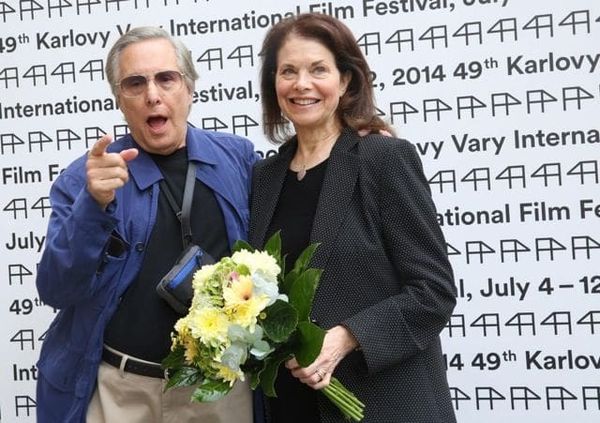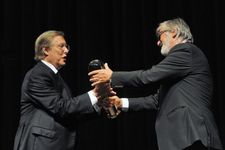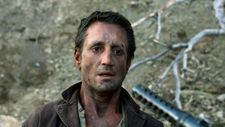 |
| William Friedkin and his wife Sherry Lansing |
In conversation, you just have to light the fuse and stand well back. The touchpaper for Friedkin is to venture on to the territory of contemporary Hollywood and its outpourings. It’s not long before he’s fanning the flames of his own discontent.
He finds it hard to think of a film that has given him much pleasure in the recent past. He finds current Hollywood philosophy at odds with his filmmaking desires. “Eighty per cent or more of the films made in the US are about superheroes and I have no interest in making those.”
It’s all so different from when he started out in the Sixties and Seventies. “The big studios now, including the so-called independents, are owned by big corporations which means there is a corporate sensibility everywhere,” he says.
 |
| William Friedkin receives his career achievement award from Karlovy Vary Film Festival president Jiří Bartoška |
Today, he suggests, the corporation would much rather take a hundred million dollars and put it all on one film than make 20 films. “It is what is called high stakes gambling. It is a product and has to please the broadest number of people, which means it cannot be abrasive in any way. If it shakes people up in their thinking then it won’t sell - and that is what the audience have been conditioned to accept. It is like opium: it has to take them out of their humdrum lives for a couple of hours rather than contributing anything to those lives.”
Friedkin, 78, heaves an almost audible sigh of relief - as if a burden has been lifted. He has always been a director who has argued for his ideas and in most cases has won. His model is Orson Welles, who went to war every day on Citizen Kane - and when initially the film did not do well at the box office, was considered to have lost the war.
Rather than feeling stymied by frustration, Friedkin launched himself into battle and reached a compromise with the studios. He cannot understand someone like the maverick Terrence Malick who took the knock-backs so much to heart that he did not make a film for 20 years (until The Thin Red Line).
Friedkin worked his way up from the bottom of the pile, starting as a callow teenager in the world of live television in the Fifites. He was directing by the time he was 21. His first cinema feature was Good Times, a 1967 vehicle for the talents of the then married Sonny and Cher. His next was a bright evocation of the last days of American burlesque in the 1920s called The Night They Raided Minsky’s, with Norman Wisdom and Britt Ekland. Then there was the screen adaptation of the gay stage show The Boys In The Band, brave for its time and which had limited success just before he hit the jackpot with The French Connection, which won him his first Oscar. Friedkin proved himself with his flair for managing setpieces, using fluid mobile cameras. The hallmark techniques are still obvious today in his chase thriller The Hunted and his previous military drama Rules of Engagement, also with Tommy Lee Jones, which helped to put him back on the map even if it’s ambiguous gung-ho aura caused a certain controversy.
 |
| Sorcerer is undergoing a reappraisal and is back on the festival circuit. |
Although he finds it tough to find subjects that engage him, cable TV has opened a whole new avenue. He directed a well received remake of the classic court-room thrilller 12 Angry Men for HBO, which he shot in ten days with George C Scott and Jack Lemmon. It garnered six Emmy nominations. When he’s not dealing in celluloid, he makes sorties as a director into the theatre and opera.
He thinks it is easy for a filmmaker to lose touch with audiences. At one stage he was veering towards the overly esoteric before coming to his senses. “A lot of my compatriots were trying to ape Godard or Truffaut - but I didn’t want to make films to hang in the Louvre,” says the man who was briefly wedded to Nouvelle Vague queen Jeanne Moreau.
Currently married to Paramount studio head honcho Sherry Lansing (who accompanies him to the Czech Republic), Friedkin has a freshingly acerbic view of his own shortcomings. When he received drubbings for such films as Sorcerer (an ill-fated attempt to remake Wages of Fear), his garish S and M gay scene thriller Cruising, the ghostly The Guardian and the truly appalling Jade, he accepts he may have been misguided, although Sorcerer has been re-evaulated and besides the screening in Karlovy Vary is also being seen on the Festival circuit and on selected release in cinemas. The Blu-Ray and DVD comes out in the States on August 5. “I never thought of it as a failure,” he says smiling. “And I don’t think about films in terms of box office. I only look at a film that I like or that I don’t like, that’s all.” He takes a certain satisfaction that a 37-year-old film suddenly is finding a new life around the world.
He considers himself as someone who practises filmmaking - “in the same way a doctor practises medicine or a lawyer practices law.” He expands: "What I try to do before each film is to immerse myself in as many aspects of it as possible, so I'm liteally swimming in it before I even expose a frame of film."
That sounds like the Friedkin credo iin a nutshell - no more, no less.





















